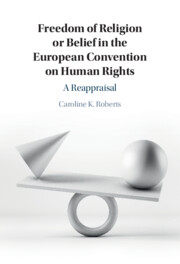Book contents
- Freedom of Religion or Belief in The European Convention on Human Rights
- Freedom of Religion or Belief in the European Convention on Human Rights
- Copyright page
- Dedication
- Contents
- Preface
- Acknowledgements
- Table of Cases, Applications and Communications
- Table of Treaties, Declarations and Other International Instruments
- Abbreviations
- Introduction
- Part I The Understanding of the Right to Freedom of Thought, Conscience and Religion in Echr Article 9
- 1 The Classic Approach in the Literature to ECHR Article 9
- 2 The Text of ECHR Article 9 and Provisions in Related International Instruments
- 3 The ECtHR’s General Principles Concerning ECHR Article 9
- Part II The ECtHR’s application of its general principles concerning the right to freedom of thought, conscience and religion in echr article 9
- Part III reappraising the understanding of the right to freedom of thought, conscience and religion in echr article 9
- Bibliography
- Index
3 - The ECtHR’s General Principles Concerning ECHR Article 9
from Part I - The Understanding of the Right to Freedom of Thought, Conscience and Religion in Echr Article 9
Published online by Cambridge University Press: 02 December 2023
- Freedom of Religion or Belief in The European Convention on Human Rights
- Freedom of Religion or Belief in the European Convention on Human Rights
- Copyright page
- Dedication
- Contents
- Preface
- Acknowledgements
- Table of Cases, Applications and Communications
- Table of Treaties, Declarations and Other International Instruments
- Abbreviations
- Introduction
- Part I The Understanding of the Right to Freedom of Thought, Conscience and Religion in Echr Article 9
- 1 The Classic Approach in the Literature to ECHR Article 9
- 2 The Text of ECHR Article 9 and Provisions in Related International Instruments
- 3 The ECtHR’s General Principles Concerning ECHR Article 9
- Part II The ECtHR’s application of its general principles concerning the right to freedom of thought, conscience and religion in echr article 9
- Part III reappraising the understanding of the right to freedom of thought, conscience and religion in echr article 9
- Bibliography
- Index
Summary
Chapter 3 focuses on the ECtHRs general principles concerning ECHR Article 9 in its jurisprudence. It contends that the ECtHR recognises the forum internum and forum externum relationship, intuitively understanding that, because actions flow from the forum internum, the forum internum is always relevant to some degree in Article 9 cases. As such, this chapter recommends conceptualising the forum internum and forum externum aspects of the right on a continuum. Whilst, this chapter argues, forum internum relevance is the principal factor weighing in favour of the applicant, it contends that it is not the only factor the ECtHR takes into consideration in Article 9 cases; the ECtHR balances in all Article 9 cases, weighing up factors pointing to a violation of Article 9 (primarily, but not forum internum relevance) with countervailing factors pointing away from a violation, to reach its decision. Given the ECtHR offers a range of protection as a result, this chapter suggests that a useful way of grouping Article 9 cases for analysis is a loose concentric circles model, comprising three circles, as this better reflects the ECtHR jurisprudence than a binary and hierarchical framework.
Keywords
- Type
- Chapter
- Information
- Freedom of Religion or Belief in the European Convention on Human RightsA Reappraisal, pp. 63 - 88Publisher: Cambridge University PressPrint publication year: 2023

